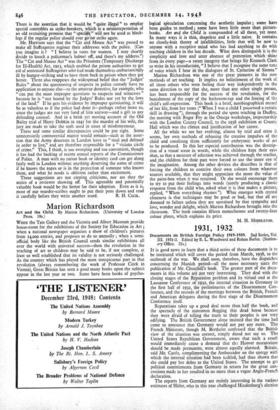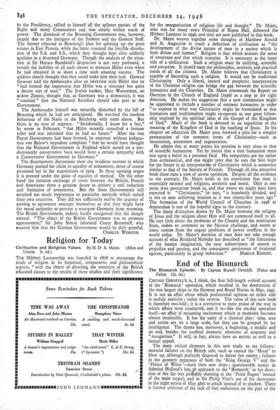1931, 1932
IT is good news to learn that a third series of these documents is to be instituted which will cover the period from March, 1938, to the outbreak of the war. We shall soon, therefore, have the dispatches concerning the Munich period—all the more necessary since the publication of Mr. Churchill's book. The greater part of the docu- ments in this volume are not very interesting. They deal with the closing stages of the Reparation problem and its virtual end at the Lausanne Conference of 1932, the internal situation in Germany in the first half of 1932, the preliminaries of the Disarmament Con- ference, and the records of the meetings between the British, French and American delegates during the first stage of the Disarmament Conference itself.
Reparations takes up a good deal more than half the book, and the spectacle of the statesmen flogging this dead horse because they were afraid of telling the truth to their peoples is not very edifying. The British Government alone insisted that the time had come to announce that Germany would not pay any more. The French Ministers, though M. Berthelet confessed that the British view of the situation was correct, simply dared not say so. The United States Republican Government, aware that such a result would immediately cause a demand that th t Hoover moratorium should be made permanent, were almost equally alarmed. Britain, said Mr. Castle, complimenting the Ambassador on the epergy with which the internal situation had been tackled, had thus shown that she could pay her debts to the United States. The attempt to get political commitments from Germany in return for the great con- cessions made to her resulted in no more than a vague Anglo-French declaration.
The reports from Germany are mainly interesting in the various estimates of Hitler, who in this year challenged Hindenburg's election to the Presidency, rallied to himself all the splinter parties of the Right and many Communists and was clearly within reach of power. The dismissal of the Bruening Government was, however, largely due to the intrigues of the Junkers and the General Staff. The former objected to Bruening's plan for splitting up the great estates in East Prussia, while the latter resented the forcible dissolu- tion of the S.A. and S.S., which they thought kept alive soldierly qualities in a disarmed Germany. Though the analysis of the situa- tion in Sir Horace Rumbold's despatches is not very profound, it reveals the inability of all such classes to measure Hitler even when he had obtained in so short a time such amazing success. The soldiers clearly thought that they could make him their tool. General Groener told the Ambassador after an interview with Hitler that he " had formed the impression that Hitler was a visionary but quite a decent sort of man." The Jewish banker, Herr Wasserman, an ardent Zionist, thought that, as Germany was a democracy, it was " essential " that the National Socialists should take part in the Government.
The Ambassador himself was naturally disturbed by the fall of Bruening which he had not anticipated. He watched the insolent behaviour of the Nazis in the Reichstag with some alarm. But there is no note of urgency. " Incidentally, I know for a fact," he wrote in February, " that Hitler recently consulted a fortune teller and was informed that he had no future." After the von Papen Government had been formed, he reported without indigna- tion von Bulow's impudent complaint " that he would have thought that the National Government in England which rested on a pre- dominantly conservative basis would have a certain sympathy with a Conservative Government in Germany."
The disarmament discussions show the insidious manner in which Germany pushed her claim to equality of armaments, never of course promised her in the negotiations of 1919. In these opening stages it is pressed under the guise of equality of method. On the other hand the intimate exchange of views between the British, French and Americans show a genuine desire to achieve a real reduction and limitation of armaments. But the three Governments still attached too much importance to particular methods which suited their own countries. They did not sufficiently realise the urgency of coming to agreement amongst themselves so that they might have the moral authority to prevent a resurgent Germany from rearming. The British Government, indeed, hardly recognised that the danger existed. "The object of the British Government was to promote appeasement," Sir John Simon informed Count Bernstorff, who assured him that the German Government would be duly grateful.
CHARLES WEBSTER.



































 Previous page
Previous page